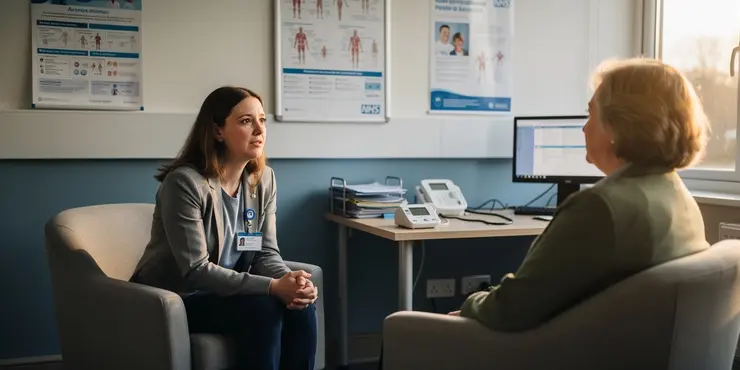
Find Help
More Items From Ergsy search
-
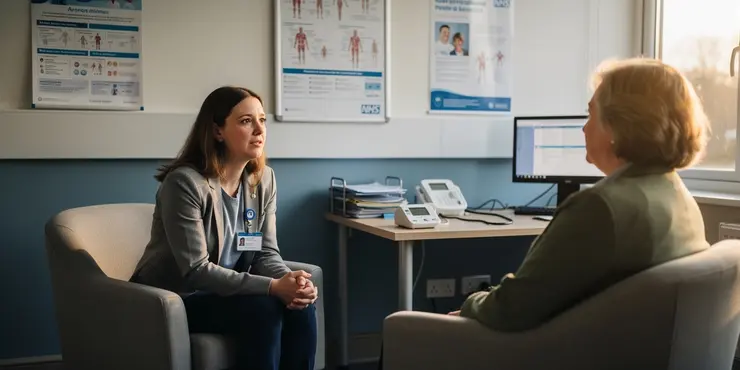
How does dementia progress over time?
Relevance: 100%
-
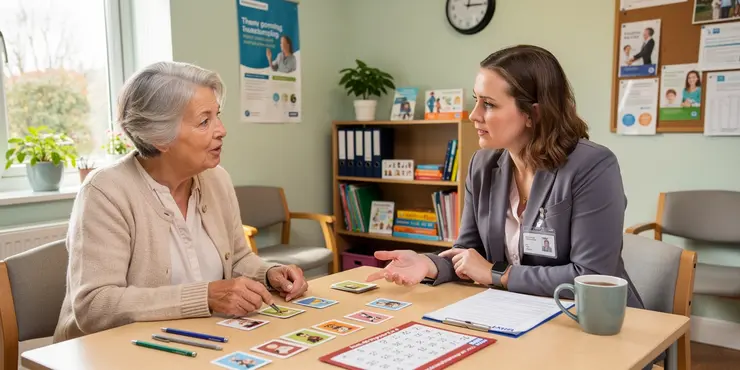
Is there a cure for dementia?
Relevance: 76%
-

What is dementia?
Relevance: 71%
-
Living with dementia | NHS
Relevance: 67%
-

Can live-in care support individuals with dementia?
Relevance: 66%
-
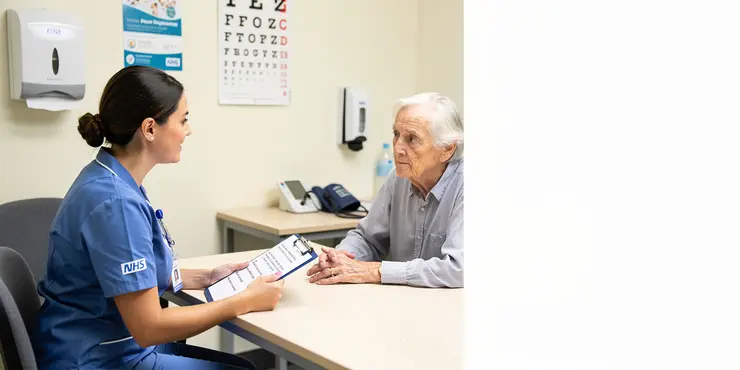
How is dementia diagnosed?
Relevance: 65%
-
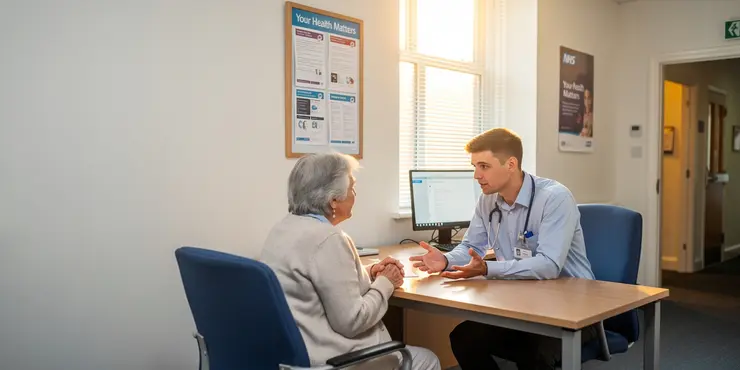
Dementia by Dr Alex Kakoullis, Coventry and Warwickshire Partnership NHS Trust
Relevance: 65%
-
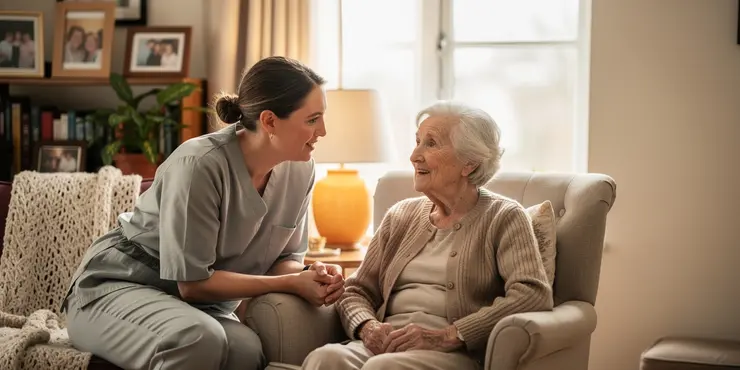
Dementia Care at Colten Care
Relevance: 62%
-
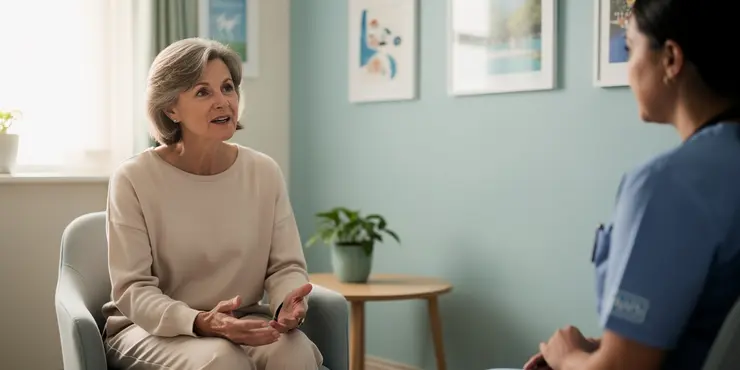
Early onset dementia | NHS
Relevance: 60%
-
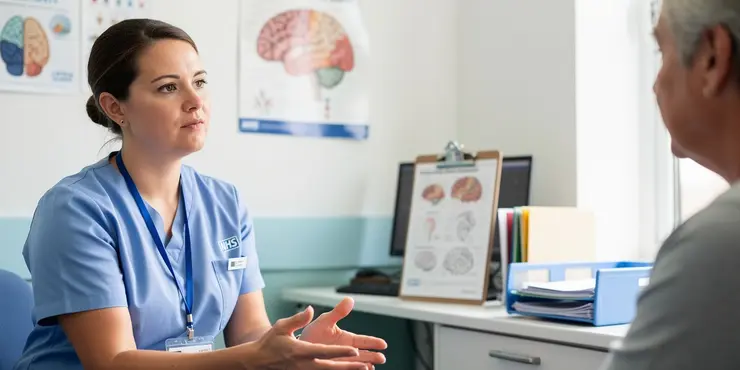
An introduction to frontotemporal dementia (FTD) (part 1/3)
Relevance: 59%
-
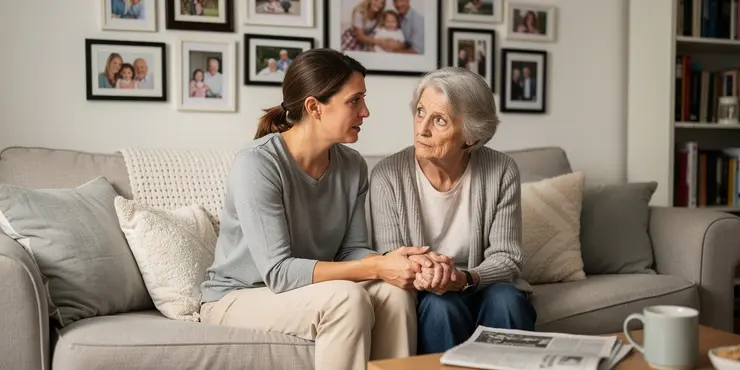
Can dementia affect younger people?
Relevance: 59%
-
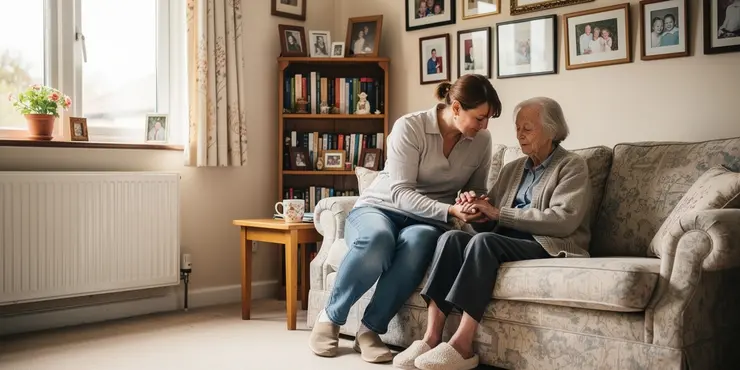
What role do carers play for those living with dementia?
Relevance: 58%
-

Is there scientific evidence linking menopause to dementia?
Relevance: 57%
-
Are there specific types of dementia linked to menopause?
Relevance: 57%
-
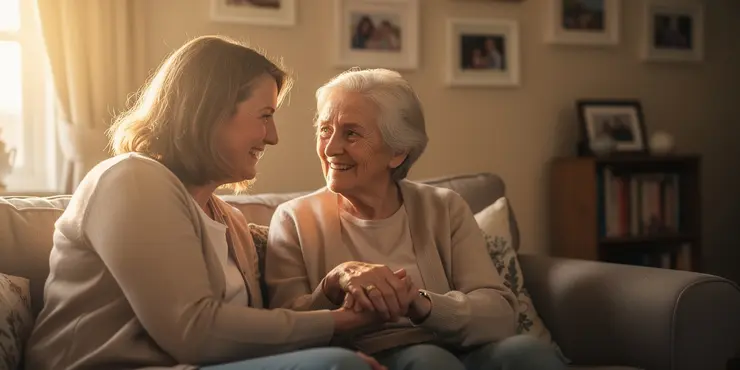
Are there any support groups for people with dementia in the UK?
Relevance: 55%
-

How common is it for women to develop dementia after menopause?
Relevance: 55%
-

What are the links between menopause and dementia?
Relevance: 54%
-
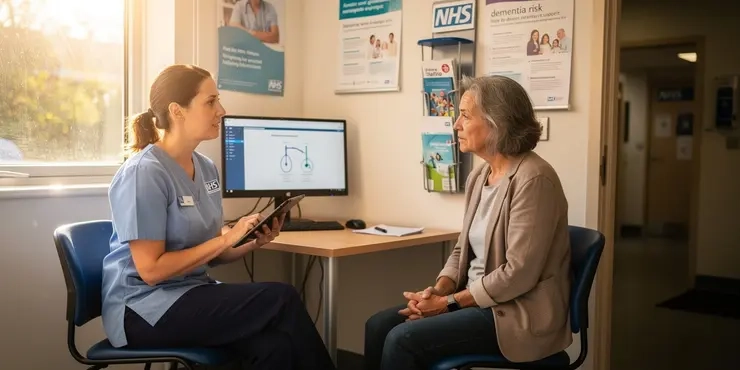
Do genetics play a role in dementia risk post-menopause?
Relevance: 53%
-
What symptoms can overlap between menopause and the early stages of dementia?
Relevance: 53%
-
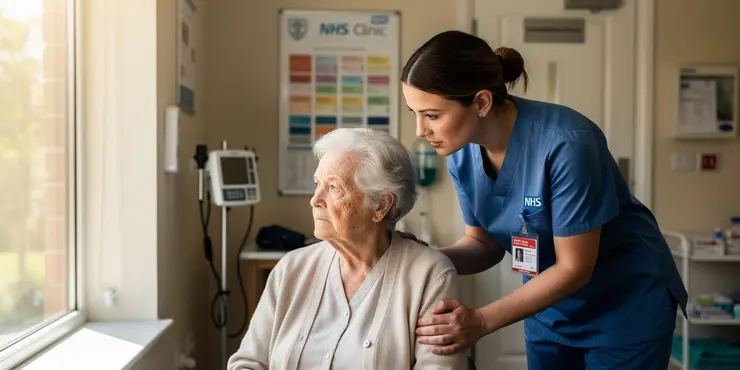
What is dementia?
Relevance: 53%
-
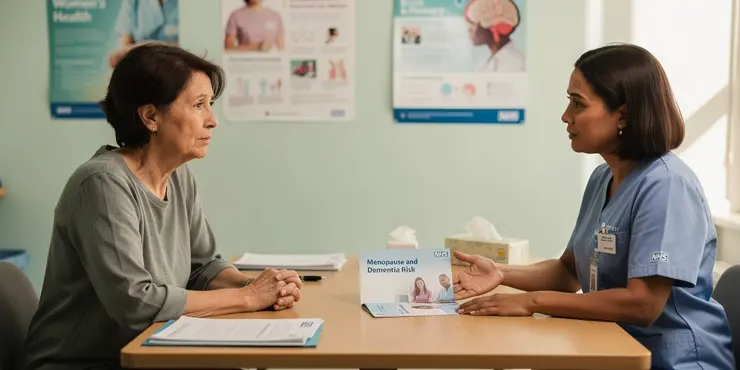
How does menopause potentially affect dementia risk?
Relevance: 53%
-

Is the age of menopause onset related to dementia risk?
Relevance: 53%
-
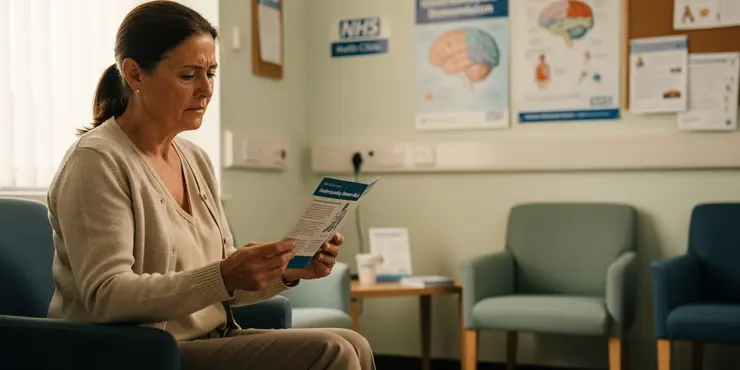
Do male and female brains age differently regarding dementia risk?
Relevance: 53%
-
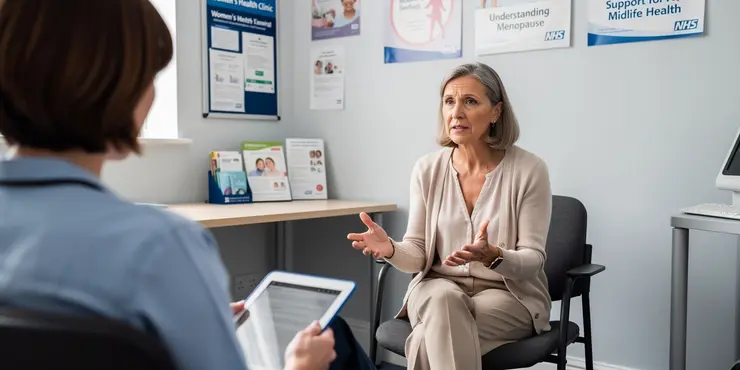
What further research is needed about menopause and dementia?
Relevance: 52%
-
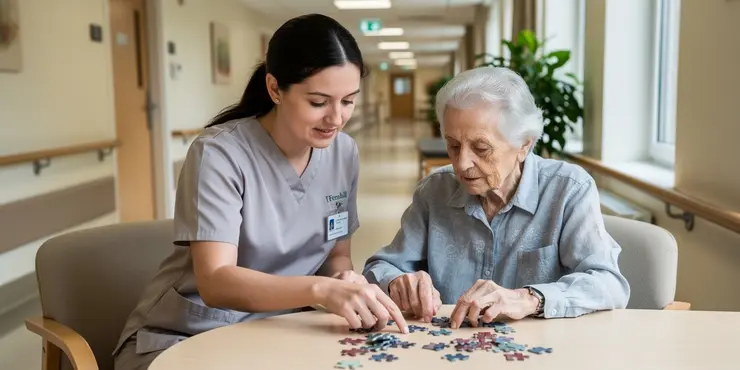
Fernhill Dedicated Dementia Care Home - a relatives perspective
Relevance: 51%
-
How does dementia progress over time?
Relevance: 50%
-
How does dementia progress over time?
Relevance: 50%
-

How is progress measured for SEND children?
Relevance: 49%
-

Can hormone replacement therapy (HRT) impact dementia risk?
Relevance: 49%
-
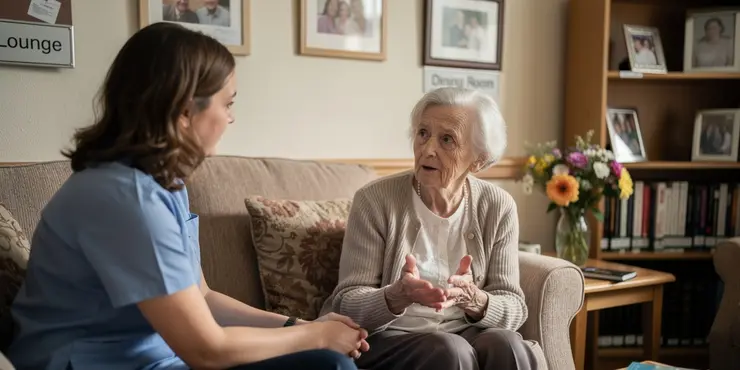
The role of care homes dedicated to caring for people living with dementia and memory loss
Relevance: 48%
-

How can I track my walking progress?
Relevance: 48%
-

Can lifestyle changes during menopause help reduce dementia risk?
Relevance: 48%
-
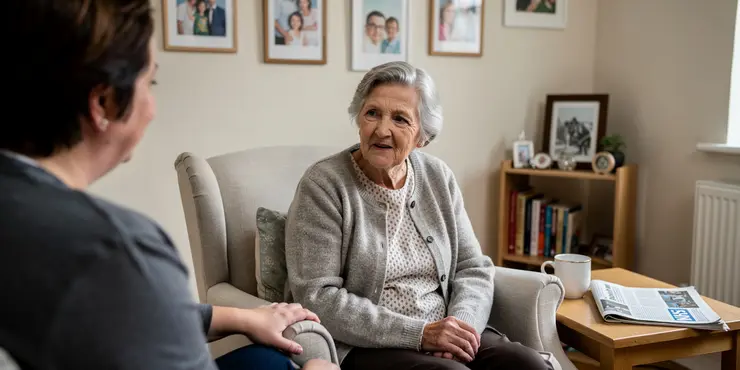
What are the common symptoms of dementia?
Relevance: 45%
-
How quickly does flesh-eating disease progress?
Relevance: 44%
-

Can AI help in monitoring lung cancer progression?
Relevance: 44%
-

What are the career progression opportunities for NHS nurses?
Relevance: 43%
-
Can lifestyle changes impact motor neurone disease progression?
Relevance: 42%
-
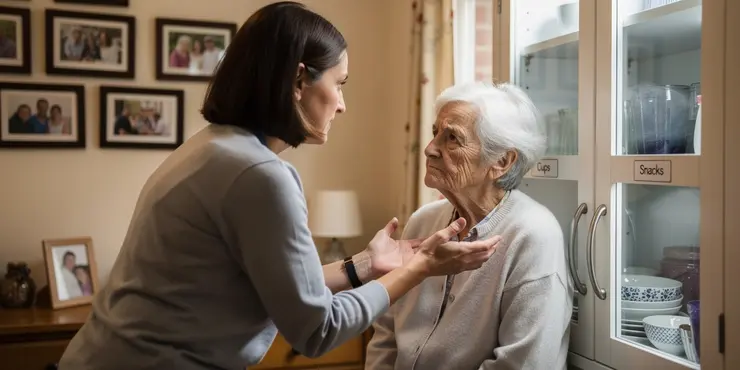
How can I support a loved one with dementia?
Relevance: 41%
-
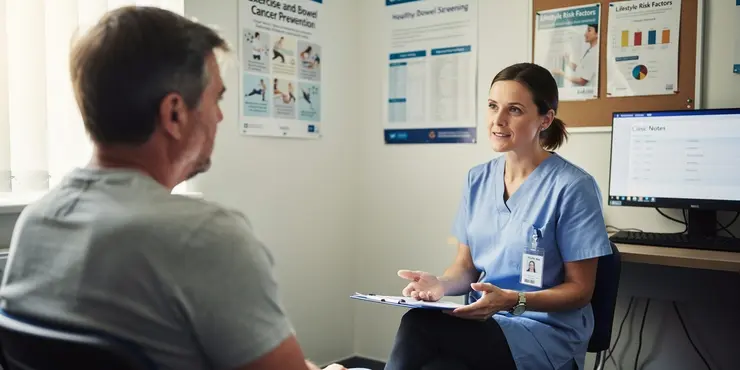
How does exercise impact bowel cancer progression?
Relevance: 41%
-
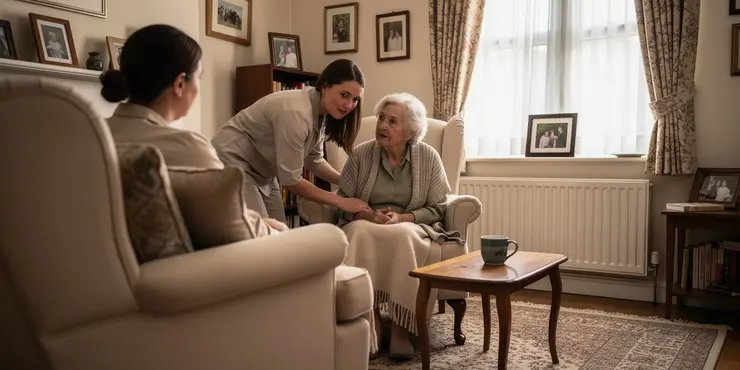
Living with changes in behaviour in frontotemporal dementia (FTD) (part 3/3)
Relevance: 41%
Introduction to Dementia
Dementia is a collective term used to describe a range of progressive neurological disorders, which all affect the brain. There are over 200 different types of dementia, but the most common types include Alzheimer's disease, vascular dementia, frontotemporal dementia, and Lewy body dementia. In the UK, dementia is one of the leading causes of death, largely due to the aging population. Understanding how dementia progresses over time is critical for supporting patients and their families.
Early-Stage Dementia
In the early stages, symptoms of dementia are often subtle and may not be immediately obvious. Common early signs include mild memory loss, difficulty finding the right words, and minor problems with concentration or planning. At this stage, individuals might still manage their daily lives with minimal support, although they may require reminders for complex tasks. Early diagnosis is crucial as it allows individuals to plan for the future and access available support services.
Middle-Stage Dementia
As dementia progresses to the middle stage, symptoms become more noticeable and may include increased forgetfulness, confusion, and disorientation. People may struggle to recognise friends or family members and might experience changes in behaviour, such as becoming easily upset or withdrawn. At this stage, everyday activities such as cooking or managing finances become challenging, and individuals often require more assistance from caregivers and healthcare professionals. Engaging in structured activities and routines can help maintain a certain level of independence and provide emotional stability.
Late-Stage Dementia
In the late stages of dementia, individuals experience significant decline in cognitive and physical abilities. Communication becomes very difficult, and many struggle with basic self-care tasks such as eating, dressing, or bathing. Mobility may be severely impaired, and the risk of infections and other medical complications increases. During this stage, round-the-clock care is often necessary. Families and caregivers need to consider support systems, potentially including hospice or residential care options, to ensure the person's health and dignified care.
End-of-Life Considerations
As dementia reaches its final stages, symptoms such as severe memory loss, complete dependency, and an increased vulnerability to infections are likely to occur. It is essential for families and caregivers to discuss and plan end-of-life care, taking into account the wishes of the person with dementia. Palliative care emphasises comfort and quality of life and involves managing symptoms and providing psychological support to the individual as well as their family. This comprehensive approach ensures that the person with dementia can live their final days with dignity and peace.
Conclusion
The progression of dementia varies greatly among individuals, influenced by the type of dementia, the person's health conditions, and their support network. By understanding the stages of dementia and planning accordingly, individuals with dementia and their families can better navigate the challenges they face, ensuring quality of care and support throughout the disease's progression.
Introduction to Dementia
Dementia is a disease that slowly harms the brain. There are many types, with over 200 kinds. The most common are Alzheimer's disease, vascular dementia, frontotemporal dementia, and Lewy body dementia. In the UK, many people die from dementia, mostly because people are living longer. Understanding how dementia changes over time is important to help people who have it and their families.
Early-Stage Dementia
In the beginning, dementia is hard to notice. A person might forget things or have trouble finding the right words. They might also find it hard to focus or plan. They can still live by themselves but might need help with tricky tasks. Finding out early is important. It helps them plan for the future and get support.
Middle-Stage Dementia
In the middle stage, it's easier to see the signs. People might forget things more, feel confused, or get lost. They might not know friends or family and could change how they act. Doing daily things like cooking or dealing with money becomes hard. They need more help now. Doing planned activities can help them feel more stable and independent.
Late-Stage Dementia
In the late stage, people with dementia struggle a lot. Talking is very hard, and they can't do basic tasks like eating or getting dressed without help. They don't move well, and they might get sick easily. They often need care all the time. Families should look at care options to make sure their loved ones are safe and well cared for.
End-of-Life Considerations
At the final stage, memory loss is very severe. The person depends completely on others and can get infections easily. Families should talk about and plan for end-of-life care, considering the person's wishes. Care that focuses on comfort and life quality is important. It involves managing pain and supporting the person and their family, so the person can feel peaceful and respected.
Conclusion
Dementia is different for everyone. It depends on the type of dementia and the person's health and support. By learning about dementia stages and planning ahead, families can better help their loved ones and make sure they get good care throughout the journey.
Frequently Asked Questions
What are the early symptoms of dementia?
Early symptoms of dementia often include memory loss, difficulty concentrating, finding it hard to carry out familiar daily tasks, confusion about time and place, and mood changes.
How does dementia typically progress over time?
Dementia is a progressive condition, meaning it tends to worsen over time. Symptoms start gradually and worsen, leading to increasing difficulty in functioning independently.
What are the stages of dementia?
Dementia is commonly divided into early, middle, and late stages, each with its own set of symptoms and challenges. As the condition progresses, symptoms become more severe.
How long does each stage of dementia last?
The duration of each stage varies widely among individuals, but early stage can last 2-4 years, middle stage around 2-10 years, and late stage can last 1-3 years or more.
What happens in the early stage of dementia?
In the early stage, individuals may experience mild memory problems, losing track of the time, becoming easily lost, and having difficulty making decisions.
What changes occur in the middle stage of dementia?
During the middle stage, memory problems become more noticeable, there may be confusion and disorientation, trouble recognizing family and friends, and increased difficulty communicating.
What are the characteristics of the late stage of dementia?
In the late stage, individuals often become completely dependent on others, experience extensive memory loss, have difficulty speaking, and may lose awareness of their surroundings.
Can the progression of dementia be slowed?
While there is currently no cure for dementia, certain medications and therapies may help slow the progression of symptoms and improve quality of life.
What are the risk factors for faster progression of dementia?
Factors such as age, genetics, concurrent medical conditions, lifestyle choices, and the type of dementia can influence how quickly the condition progresses.
Does dementia progression follow a set pattern?
Dementia progression can vary significantly among individuals. The pattern and speed of progression depend on several factors including type of dementia and overall health.
What is the role of caregivers as dementia progresses?
As dementia advances, caregivers play an essential role in ensuring safety, providing emotional support, managing daily activities, and coordinating medical care.
How can families prepare for the progression of dementia?
Families can prepare by educating themselves about the illness, planning for future care needs, making legal and financial arrangements, and seeking support from professionals and support groups.
What are the behavioral changes seen in dementia progression?
Behavioral changes can include increased forgetfulness, agitation, aggression, wandering, sleep disturbances, and mood swings.
How does dementia impact physical health over time?
As dementia progresses, individuals may experience issues like difficulty walking, incontinence, weight loss, and increased risk of infections.
Is it possible for someone with dementia to live at home as the disease progresses?
Many people with dementia can live at home with appropriate support, adaptations, and resources, but some may eventually require more intensive care provided in a facility.
What are some common misconceptions about dementia progression?
Common misconceptions include the belief that dementia progresses uniformly, that nothing can be done to help, and that all types of dementia progress the same way.
How does Alzheimer's disease, a common form of dementia, progress?
Alzheimer's typically progresses from mild memory loss in the early stage to severe cognitive and physical decline in the late stage over several years.
What is the importance of early diagnosis in dementia?
Early diagnosis allows for better management of symptoms, planning for future care, accessing resources, and starting appropriate treatments sooner.
How can lifestyle choices affect the progression of dementia?
Healthy lifestyle choices such as regular exercise, a balanced diet, social engagement, and cognitive activities may help slow symptom progression.
How does vascular dementia progress differently from Alzheimer's?
Vascular dementia often progresses in a step-wise manner with periods of stability, while Alzheimer's disease typically has a gradual and continuous decline.
What are the first signs of dementia?
Dementia can change how a person thinks and acts. Here are some early clues:
- Forgetting things, like names or important dates.
- Having trouble planning or solving problems, like working with numbers.
- Finding it hard to do daily tasks, like making a cup of tea.
- Getting lost in places they know well.
- Confusing words, like calling a "watch" a "clock."
If you notice these signs, it could help to talk to a doctor.
Using pictures or drawing may help to understand better.
Ask questions if you are unsure.
Early signs of dementia can be:
- Forgetting things easily.
- Having trouble focusing.
- Finding it hard to do daily activities.
- Getting confused about where you are or what day it is.
- Feeling moody or different.
Tools that can help:
- Make lists to remember things.
- Use alarms or reminders for activities.
- Follow a simple routine every day.
- Keep a calendar to track time and dates.
- Talk to a friend or family member if you feel upset.
What happens to a person with dementia over time?
Dementia is an illness that gets worse over time. It starts slowly, but it can make it harder for people to do things on their own as it gets worse.
What are the steps of dementia?
Dementia is a condition that changes how the brain works. It happens in steps or stages. Here is a simple way to understand these steps:1. Early Stage: At first, people might forget things or lose track of time. They may have trouble remembering names or places.
2. Middle Stage: Later on, people might get confused more easily and need help with daily activities like getting dressed or cooking.
3. Late Stage: In the last stage, people may have trouble speaking or moving. They will need a lot of help from others.
If someone you know has dementia, it's important to be kind and patient. It helps to talk clearly and use simple words. Some people find it helpful to write things down or use pictures.
Dementia has three stages: early, middle, and late. Each stage has different signs and challenges. As time goes on, the signs get worse.
How long does each stage of dementia last?
Dementia has different stages. Each stage can last a different amount of time. It is hard to say exactly how long each stage will last, as it can be different for every person.
Here is a simple way to understand the stages:
Early Stage: This is when changes start. It might last 2 to 4 years.
Middle Stage: This is when more help is needed. It might last 2 to 10 years.
Late Stage: This is when a lot of care is needed. It might last 1 to 3 years.
Remember, these are just estimates. Every person is different.
If you want help understanding dementia, you can:
- Talk to a doctor or nurse.
- Use picture books about dementia.
- Watch videos made for kids about dementia.
The time each stage lasts is different for everyone. The first stage can last 2 to 4 years. The middle stage can last around 2 to 10 years. The last stage can last 1 to 3 years or more.
What happens in the early stage of dementia?
Dementia is a condition that affects the brain. It can make it hard to remember things or think clearly. In the early stage of dementia, people might:
- Forget recent events or names of people they know.
- Have trouble finding the right words.
- Get confused about the day or time.
- Find it hard to make decisions.
Here are some things that can help:
- Use calendars or notes to remember important things.
- Ask for help from family or friends.
- Make a routine to follow each day.
If someone you know has early stage dementia, you can support them by being patient and understanding.
At the start, people might have a little trouble remembering things. They could forget what time it is, get lost easily, and find it hard to choose what to do.
What happens in the middle part of dementia?
In the middle stage of dementia, a person may:
- Have trouble remembering things.
- Find it hard to talk or understand others.
- Need help with daily tasks like getting dressed.
- Feel confused about time or place.
- Sometimes get lost or wander around.
Helpful tools can be:
- Using pictures to show what things mean.
- Keeping a simple daily routine.
- Using signs or labels to show where things are.
- Having someone to help with tasks.
In the middle stage, it is easier to see memory problems. A person might get confused or feel lost. They may have trouble knowing who their family and friends are and find it hard to talk.
What happens in the last stage of dementia?
At this stage, people often need a lot of help from others. They might forget almost everything. Talking can be hard for them, and they might not know where they are. Using picture cards or simple words can help them understand and communicate.
Can we slow down dementia?
There is no cure for dementia right now. But some medicines and therapies can help slow it down and make life better.
What makes dementia get worse faster?
How fast dementia gets worse can depend on different things. These things include:
- How old you are.
- Your genes, which are like a blueprint for your body.
- If you have any other health problems.
- The way you live, like if you eat healthy or exercise.
- The kind of dementia you have.
To help understand and manage these factors, you can use tools like:
- Making charts or lists to track changes over time.
- Talking to your doctor about any health worries.
- Using apps or reminders to remember important stuff.
Does Dementia Always Change in the Same Way?
Dementia does not always change in the same way for everyone.
People with dementia might have different experiences. Some changes might happen quickly, while others take longer.
It is important to know that each person is different.
To help understand dementia better, here are some things you can do:
- Talk to doctors or nurses. They can give you information.
- Read easy books or watch videos made for children.
- Ask someone you trust to explain it to you.
Dementia gets worse in different ways for different people. How quickly it gets worse depends on the type of dementia and how healthy the person is.
What do caregivers do when dementia gets worse?
Caregivers help people with dementia. As dementia gets worse, caregivers do more things to help. They might:
- Help with getting dressed and eating.
- Make sure the person is safe.
- Talk to doctors and other helpers.
It's important to be patient and kind. Using things like pictures or videos can help with understanding. Talking slowly and using simple words can help too.
When dementia gets worse, helpers are very important. They keep people safe, help with feelings, handle everyday tasks, and help with doctor visits.
How can families get ready when someone has dementia?
Families can help by doing simple things: - **Talk Together**: Share feelings and plans with each other. - **Learn About Dementia**: Read books or watch videos to understand more. - **Plan Ahead**: Decide on important things like money and where to live. - **Get Help**: Ask doctors or support groups for advice. - **Stay Connected**: Spend time together and do fun activities. Helpful tools: - **Create a Calendar**: Use it to remember important dates and tasks. - **Keep a Notebook**: Write down important information and reminders. - **Use Pictures and Labels**: This can help with remembering names and objects. These steps can make it easier for everyone.Families can get ready by learning about the illness. They should think about what care is needed in the future. They can also make important plans for money and legal things. It is helpful to talk to experts and join support groups.
How does dementia affect behavior over time?
Dementia is an illness that affects the brain. It can change how a person acts. Here are some ways behavior might change:
- People may forget things more often.
- They might feel confused or get lost, even in places they know well.
- Mood changes can happen. A person might feel sad, angry, or scared more easily.
- A person might not understand jokes or cannot concentrate as well on activities.
- There may be changes in how they sleep or eat.
It's important to be patient and kind. Support tools like using clear signs, keeping a routine, and using pictures can help someone with dementia feel better.
Behavior changes can happen if someone is sick. These changes can be:
- Forgetting things more than usual.
- Getting upset easily.
- Feeling angry or aggressive.
- Walking around aimlessly.
- Having trouble sleeping well.
- Feeling happy one moment and sad the next.
If you need help understanding or remembering things, you can use a notebook to write down important information, ask someone you trust for help, or use reminders on a phone or a calendar.
How does dementia change the body over time?
Dementia is an illness that affects the brain. It makes it hard to remember things and think clearly. Over time, it can also change the way the body works.
Here are some ways dementia can affect the body:
- Movement: People with dementia might have trouble walking or moving. They may get weaker and need more help.
- Balance: It might be easy to fall or lose balance.
- Weight: People might lose or gain weight because they forget to eat or eat too much.
- Sleep: They may sleep more during the day and less at night.
Tools to help:
- Sticky Notes: Write reminders for eating or taking medicine.
- Alarms: Use alarms to remember important things.
- Walking Aids: Use canes or walkers to help with balance.
As dementia gets worse, people might have trouble walking. They might also have accidents and wet their pants. Sometimes, they might lose weight, and they can get sick more easily.
To help someone with dementia:
- Encourage using a walking stick or walker for support.
- Make sure the bathroom is easy to get to.
- Offer meals that are healthy and easy to eat.
- Keep an eye on their health and visit the doctor if they feel sick.
Can a person with dementia stay at home as they get worse?
Yes, a person with dementia can stay at home. Here are some tips to help:
- Get help from family or friends.
- Use alarms to remember things.
- Make the home safe with handrails.
- Label things to know what they are.
- Try using a pill box for medicines.
- Ask a nurse to visit at home.
These ideas can help keep them safe and happy at home.
People with dementia can often live at home if they get the right help and make some changes at home. But, sometimes, they might need to go to a special place where they can get more care.
What are things people often get wrong about how dementia changes?
Here are ways to understand dementia better:
- Dementia changes slowly over time. It does not happen all at once.
- People with dementia can still enjoy life and do many things.
- Everyone’s experience with dementia is different. No two people are the same.
Helpful tools:
- Pictures can help explain ideas.
- Stories about people with dementia can help us learn.
- Talking with someone who knows about dementia can be useful.
Many people think wrong things about dementia. Some people think it always gets worse in the same way, but this is not true. Others believe nothing can help, but there are things that can be done. Different types of dementia can get worse in different ways.
Here are some things that can help:
- Talking to a doctor to learn more about the type of dementia.
- Joining a support group for people with dementia.
- Using memory aids, like notes or calendars, to help remember things.
What happens as Alzheimer's disease, a common type of dementia, gets worse?
Alzheimer's disease is a sickness that makes it hard to remember and think. As it gets worse, people have more trouble with everyday things.
- First, they might forget where they put things or the names of people they know.
- Later, they might get confused about time or place. They might not know where they are.
- Then, they might need help with dressing, eating, and taking a bath.
- Finally, they might not know who their family and friends are and need full-time care.
If you or someone you know has Alzheimer's, it helps to use calendars, labels, and reminders to keep track of things. Ask family or friends for help when you need it.
Alzheimer's is a disease that affects the brain. It starts with a little forgetfulness. This is the first stage. It gets worse over time. People start to forget more and it can be hard for them to think clearly. This is the last stage. It happens slowly over many years.
If you need help understanding this text, you might try using a ruler to keep your place as you read. Reading out loud or using apps that read the text to you can also be helpful.
Why is it important to find out about dementia early?
Finding out that someone has dementia early is very important. It helps doctors and families plan how to give care and support. It also means that treatments can start sooner, which can help the person feel better for longer.
If you or someone you know might have dementia, it is good to talk to a doctor. They can do tests to check. There are also ways to make everyday life easier, like using reminder notes or alarms to help remember things.
Finding out about a health problem early helps in many ways. It helps doctors take care of the symptoms better. It lets people and their families plan for the future. It also helps them get the support and services they need. And, it means they can start the right treatments sooner.
How do the way we live change how fast dementia gets worse?
Making good choices can help you stay healthy. You can:
- Exercise a lot.
- Eat different healthy foods.
- Spend time with friends and family.
- Do puzzles or play brain games.
These can help you feel better longer!
How is vascular dementia different from Alzheimer's?
Vascular dementia changes happen in steps. You might feel okay for a while, then it gets worse suddenly. Alzheimer's disease gets worse slowly all the time.
It can help to use simple reminder tools, like calendars or notes on your phone.
Useful Links
This website offers general information and is not a substitute for professional advice.
Always seek guidance from qualified professionals.
If you have any medical concerns or need urgent help, contact a healthcare professional or emergency services immediately.
Some of this content was generated with AI assistance. We’ve done our best to keep it accurate, helpful, and human-friendly.
- Ergsy carfully checks the information in the videos we provide here.
- Videos shown by Youtube after a video has completed, have NOT been reviewed by ERGSY.
- To view, click the arrow in centre of video.
- Most of the videos you find here will have subtitles and/or closed captions available.
- You may need to turn these on, and choose your preferred language.
- Go to the video you'd like to watch.
- If closed captions (CC) are available, settings will be visible on the bottom right of the video player.
- To turn on Captions, click settings .
- To turn off Captions, click settings again.
More Items From Ergsy search
-

How does dementia progress over time?
Relevance: 100%
-

Is there a cure for dementia?
Relevance: 76%
-

What is dementia?
Relevance: 71%
-
Living with dementia | NHS
Relevance: 67%
-

Can live-in care support individuals with dementia?
Relevance: 66%
-

How is dementia diagnosed?
Relevance: 65%
-

Dementia by Dr Alex Kakoullis, Coventry and Warwickshire Partnership NHS Trust
Relevance: 65%
-

Dementia Care at Colten Care
Relevance: 62%
-

Early onset dementia | NHS
Relevance: 60%
-

An introduction to frontotemporal dementia (FTD) (part 1/3)
Relevance: 59%
-

Can dementia affect younger people?
Relevance: 59%
-

What role do carers play for those living with dementia?
Relevance: 58%
-

Is there scientific evidence linking menopause to dementia?
Relevance: 57%
-
Are there specific types of dementia linked to menopause?
Relevance: 57%
-

Are there any support groups for people with dementia in the UK?
Relevance: 55%
-

How common is it for women to develop dementia after menopause?
Relevance: 55%
-

What are the links between menopause and dementia?
Relevance: 54%
-

Do genetics play a role in dementia risk post-menopause?
Relevance: 53%
-
What symptoms can overlap between menopause and the early stages of dementia?
Relevance: 53%
-

What is dementia?
Relevance: 53%
-

How does menopause potentially affect dementia risk?
Relevance: 53%
-

Is the age of menopause onset related to dementia risk?
Relevance: 53%
-

Do male and female brains age differently regarding dementia risk?
Relevance: 53%
-

What further research is needed about menopause and dementia?
Relevance: 52%
-

Fernhill Dedicated Dementia Care Home - a relatives perspective
Relevance: 51%
-
How does dementia progress over time?
Relevance: 50%
-
How does dementia progress over time?
Relevance: 50%
-

How is progress measured for SEND children?
Relevance: 49%
-

Can hormone replacement therapy (HRT) impact dementia risk?
Relevance: 49%
-

The role of care homes dedicated to caring for people living with dementia and memory loss
Relevance: 48%
-

How can I track my walking progress?
Relevance: 48%
-

Can lifestyle changes during menopause help reduce dementia risk?
Relevance: 48%
-

What are the common symptoms of dementia?
Relevance: 45%
-
How quickly does flesh-eating disease progress?
Relevance: 44%
-

Can AI help in monitoring lung cancer progression?
Relevance: 44%
-

What are the career progression opportunities for NHS nurses?
Relevance: 43%
-
Can lifestyle changes impact motor neurone disease progression?
Relevance: 42%
-

How can I support a loved one with dementia?
Relevance: 41%
-

How does exercise impact bowel cancer progression?
Relevance: 41%
-

Living with changes in behaviour in frontotemporal dementia (FTD) (part 3/3)
Relevance: 41%


